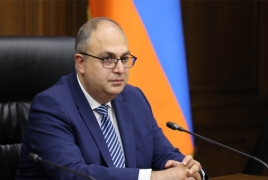
During the summer session of the Parliamentary Assembly of the Council of Europe (PACE), Vladimir Vardanyan, a member of the Armenian National Assembly’s delegation, emphasized that all prisoners of war must be repatriated following the end of hostilities, and that the unjustified delay in doing so constitutes an international crime, according to the National Assembly's press service.
Vardanyan stated that the treatment of POWs in this context violates international humanitarian law.
“Ladies and gentlemen, being a prisoner of war is not a punishment. It is simply a means to prevent a combatant’s return to the battlefield. Unfortunately, the current reality equates POWs with criminals. We are turning POW camps into penal institutions, and sadly, prisoners of war are increasingly subjected to beatings and torture.”
This, he stressed, completely undermines the Geneva Conventions, which clarify that captivity is solely intended to keep soldiers off the battlefield.
“When we speak of POWs and their exchange, we must remember that after the end of hostilities, all POWs must be repatriated. Unjustified delays in their return are themselves an international crime.”
Moreover, the Geneva Conventions explicitly require the repatriation of certain categories of POWs even during active conflict. These include the seriously ill, mentally disabled, or permanently incapacitated—individuals who must be released regardless of ongoing fighting.
“This report serves as a reminder that international humanitarian law remains in effect. I also want to remind all authoritarian leaders that crimes against humanity and war crimes have no statute of limitations under international criminal law,” he added.
In September 2023, following a nine-month blockade of Artsakh and the ethnic cleansing of its Armenian population, Azerbaijan captured former Artsakh leaders, including ex-presidents Arkadi Ghukasyan, Bako Sahakyan, and Arayik Harutyunyan, as well as former state minister Ruben Vardanyan, former foreign minister Davit Babayan, and others. They face fabricated charges that could result in life imprisonment. A politically motivated trial began in Baku on January 17.

